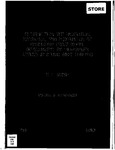In Momentum: The Navigation, Narration, and Negotiation of Continuing Professional Development by Mid-Career Artists in South West England
| dc.contributor.supervisor | Mock, Roberta | |
| dc.contributor.author | Smith, Karen Mary | |
| dc.contributor.other | Faculty of Arts, Humanities and Business | en_US |
| dc.date.accessioned | 2011-01-10T08:32:37Z | |
| dc.date.available | 2011-01-10T08:32:37Z | |
| dc.date.issued | 2010 | |
| dc.identifier | 10096943 | en_US |
| dc.identifier.uri | http://hdl.handle.net/10026.1/305 | |
| dc.description.abstract |
This thesis explores the Continuing Professional Development (CPD) of mid-career artists in England and the South West of England in particular during 2000 to 2010. It identifies what their needs are and asks what CPD means to them; how they navigate their careers through their practice; how they articulate their needs; and how they negotiate to fulfil those needs. It examines to what extent the providers’ thinking about, and provision of, CPD in the region is aligned with the needs of the artists themselves. The individual narratives of artists are represented at the centre of this research. The research was developed in collaboration with University of Plymouth and the CPD agency, ArtsMatrix Ltd. Research methods used to collect data included extended dialogues with the artists Alyson Hallett, Mariele Neudecker, Helen Poynor and Phil Smith, via a series of walking interviews, using walking as an ethnographic research tool. By walking I engaged with a literal momentum of movement paralleling the physical and theoretical momentums of the artists’ practices. Policy and literature reviews; group interviews; artist interviews; desk-based research; observation and attendance at artist-led seminars and practice groups were also used. The research contrasts two CPD Schemes: The Contemporary Craft Fellowship Scheme, and The Artist as Cultural Agent: DIY. The thesis includes a policy and provision review of CPD literature in the UK and South West of England over the past ten years; a mapping of South West CPD provision for artists; and the identification and application of relevant theoretical and critical approaches to place, space, language and momentum in order to consider CPD provision in relation to the articulation, situation and concept of a career. This thesis argues that the language of CPD can constrain as much as enable artists’ development; that the terms “mid-career” and “South West” are open to contestation and can affect provider conceptualisations of artists in the region; and that artists need professional development throughout their careers but may not name it as such. I advocate for policy and provision to understand artists’ need to be supported “throughout” their practices rather than at certain points in a career, and advocate walking as both a research method and as one of a number of facilitative practices for those who provide CPD with or for experienced artists. I also advocate for artist-led CPD initiatives and an administrative support agency for artists. | en_US |
| dc.description.sponsorship | AHRC | en_US |
| dc.language.iso | en | en_US |
| dc.publisher | University of Plymouth | en_US |
| dc.subject | Artists | en_US |
| dc.subject | Performance | |
| dc.subject | Visual Arts | |
| dc.subject | Dance | |
| dc.subject | Choreography | |
| dc.subject | Literature | |
| dc.subject | Continuing Professional Development (CPD) | |
| dc.subject | Cultural Theory | |
| dc.title | In Momentum: The Navigation, Narration, and Negotiation of Continuing Professional Development by Mid-Career Artists in South West England | en_US |
| dc.type | Thesis | |
| dc.identifier.doi | http://dx.doi.org/10.24382/4373 |
Files in this item
This item appears in the following Collection(s)
-
01 Research Theses Main Collection
Research Theses Main



